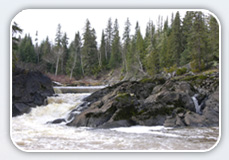Types of Power
Current Ontario public policy is focused on eliminating coal fired electricity generation in this province by 2014 and increasing renewable energy sources such as waterpower, wind, solar and biomass. More localized sources of generation are also being encouraged to reduce the need for long distance transmission of power.
Nuclear
Canadians have been utilizing nuclear energy for over 45 years. Nuclear energy currently provides over 50% of Ontario’s energy. Although this form of energy is considered clean, efficient and reliable, the generation plants are expensive to build and have a relatively short life span of approximately 30-40 years.
Fossil Fuels
This category includes fuels from remains of organisms with a high content of carbon and hydrogen, which are preserved in rocks within the earth's surface. Fossil fuels are considered a non-renewable energy resource and produce atmospheric emissions that are costly to minimize. There are three main types of fossil fuel including coal, oil and natural gas, all of which are commodities subject to significant price swings.
Renewables
By definition, renewable energy is derived from a source that can be sustainably replenished. The most widely-used renewable energy sources are: water, wind, solar and biomass and each has unique social, environmental and economic benefits.
Using a renewable source of energy minimizes negative impacts on the environment. Both the govenments of Ontario and Canada support and encourage the use of renewable energy as a means to address climate change, greenhouse gas emissions and the price volatility of oil and other fossil fuels.
Waterpower is among the most efficient and reliable renewable energy sources. Most waterpower facilities can last upward of 80-100 years and then can be rebuilt. Water is dense (approximately 800 times denser than air) and even a slow flowing stream of water can produce significant energy. Wind and solar power are also emission free and make up an important part of our green energy supply mix, but they are unpredictable and cannot be stored. The wind may not blow or the sun may not be shining when peaking power is required.
Click here for more on the Benefits of Waterpower
Click here for more on the Permitting and Approval Process for Waterpower











